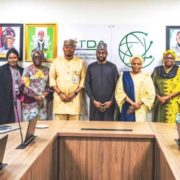Nigeria’s Digital Economy at the Heart of National Growth
Nigeria is reinforcing its digital resilience through robust cybersecurity policies and enhanced digital infrastructure. The country is also investing in human capital development to harness the transformative power of Artificial Intelligence (AI). According to the Director-General of the National Information Technology Development Agency (NITDA), Kashifu Inuwa Abdullahi, digital economy is central to Nigeria’s development.
RELATED: AI readiness lags ambitions: Survey highlights key gaps threatening generative AI success
He spoke while delivering a keynote titled “Securing Digital Economy: Strengthening Infrastructure and Harnessing the Power of Artificial Intelligence” at the Cyber Nigeria Summit. The event was organised by the Cybersecurity Experts Association of Nigeria (CSEAN). Abdullahi noted that the digital economy was contributing about 17% to the nation’s GDP and influencing nearly all other sectors.
“The service sector alone contributes around 58% of national output, showing how deeply digital technologies are integrated into our lives,” he stated.
AI and Cyber Threats: Balancing Opportunity with Risk
While AI accelerates innovation and productivity, Abdullahi warned that it also enables cybercriminals to launch more sophisticated attacks.
“Cybercrime now costs the world over $10 trillion annually, making it the most profitable form of crime,” he said, citing the World Economic Forum, which ranks cybersecurity among the top five global threats.
He emphasized that digital infrastructure security (DIS) must evolve to cover not just servers and networks but also utilities and telecoms. DIS also covers emerging systems like autonomous vehicles, which could pose serious risks if compromised.
AI security, he added, depends on three core elements — data, computing power, and algorithms — each of which must be protected to ensure system integrity.
Human Factor: The Weakest Link in Cybersecurity
Abdullahi noted that human error accounts for up to 95% of cyber incidents globally, despite two decades of cybersecurity awareness.
“Cybercriminals target human behavior because it’s easier to exploit people than to penetrate well-secured systems,” he said, urging Nigerians to practice strong cyber hygiene, such as using secure passwords, enabling multi-factor authentication, and avoiding phishing traps.
Four Pillars of Nigeria’s Cybersecurity Framework
The NITDA DG outlined four strategic pillars driving Nigeria’s cybersecurity agenda:
- Governance – Guided by the Nigerian Cybercrime Act, recently updated to address emerging threats, and backed by a Presidential Executive Order designating critical digital assets as national infrastructure.
- Capacity Building – Bridging the global cybersecurity talent gap through the 3 Million Tech Talent (3MTT) programme and the National Digital Literacy Framework (NDLF), targeting 95% digital literacy by 2030.
- Incident Management – Through the National Cybersecurity Coordination Centre (NCCC) under the Office of the National Security Adviser, alongside sectoral CERTs for finance, communication, and law enforcement.
- Collaboration – Working with the African Union, Smart Africa, global CERTs, and leading tech companies to bolster collective defense.
“Cybersecurity cannot be managed in isolation. Collaboration is key to collective resilience,” Abdullahi stated.
Building a Secure Digital Generation
Starting from 2026, digital literacy and cybersecurity education will be introduced across all levels of education — from kindergarten to tertiary institutions — as part of Nigeria’s long-term plan to nurture a security-conscious generation.
In partnership with the Office of the National Security Adviser (ONSA), NITDA is also finalizing the National Cybersecurity Architecture, designed to enhance accountability, information sharing, and unified defense against digital threats.
“Our mission is to secure Nigeria’s digital future — one that is innovative, inclusive, and protected,” Abdullahi concluded.

































